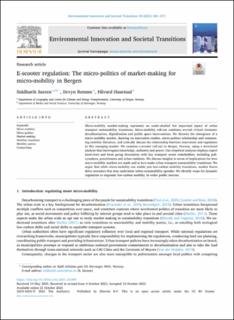E-scooter regulation: The micro-politics of market-making for micro-mobility in Bergen
Journal article, Peer reviewed
Published version

Åpne
Permanent lenke
https://hdl.handle.net/11250/2829631Utgivelsesdato
2021Metadata
Vis full innførselSamlinger
- Department of Geography [676]
- Registrations from Cristin [10412]
Originalversjon
Environmental Innovation and Societal Transitions. 2021, 40, 461-473. 10.1016/j.eist.2021.10.009Sammendrag
Micro-mobility market-making represents an under-studied but important aspect of urban transport sustainability transitions. Micro-mobility roll-out combines several critical elements: decarbonisation, digitalisation and public space interventions. We theorise the emergence of a micro-mobility market, drawing on innovation studies, micro-politics scholarship and commoning mobility literature, and critically discuss the relationship between innovation and regulation in this emerging market. We examine e-scooter roll-out in Bergen, Norway, using a structured analysis that interrogates knowledge, authority and power. Our empirical analysis employs expert interviews and focus group discussions with key transport sector stakeholders, including policymakers, practitioners and urban residents. We discuss insights in terms of implications for how micro-mobility markets are made and in turn make urban transport sustainability transitions. We argue that while micro-mobility can enable just low-carbon mobility transitions, market forces drive outcomes that may undermine urban sustainability agendas. We identify scope for dynamic regulation to engender low-carbon mobility in wider public interest.
